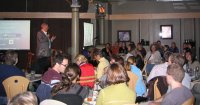 |
 |
|||||||||||||
|
|||||||||||||
|
|||||||||||||
|
ILC: Gateway to the Quantum Universe? Got it. The September 2007 issue of NewsLineQ? Got it. General ILC brochure? Got it. A handful of one pagers to explain how the ILC works? Got it; got it; got it; got it. The ILC scientific community now has a number of communication tools at its fingertips. Handing out brochures is only half the job though. The rest is up to you, the ILC community. We can help you get started, perhaps at your local science café.
These days science cafés, as they are known in the US, seem to be popping up everywhere around the globe. They go by many names -- Science Pub, Ask a Scientist, Science on Tap - but they all serve as forums to engage the general public in topics about science and technology. Many of the US science cafés draw inspiration from Café Scientifique, the original café that started in Leeds, England in 1998. From England to Iran to Australia to Pakistan, today Café Scientifiques exist on almost every continent. In September, Jim Brau, co-chair of the Worldwide Study and physics professor at the University of Oregon, participated in a Science Pub at Luna in Eugene, Oregon. This particular science café meets on a monthly basis in a jazz club. Each month the organiser, Amanda Thomas, selects a different topic and finds a speaker to give a brief presentation that will hopefully stimulate a conversation. As the coordinator for adult learning programmes at the Oregon Museum of Science and Industry (OMSI) in Portland, Thomas likes the science café format because it creates a fun atmosphere. “People respond to it,” she says. “It isn't a stuffy lecture hall.” Thomas usually organises Science Pubs that focus on health-related or environmental issues, so choosing particle physics was a slight departure from the norm. She had no doubt, however, that Brau's presentation titled “Particles, Energy and Our Mysterious Universe,” would engage the audience, and she was right. “The questions went on for nearly an hour following my talk,” says Brau. “They were only cut off by the need to clear the room for the evening music event.” Even more impressive, one person in the crowd of more than 100 people answered all 10 questions in the pre-talk quiz correctly - a first for the Science Pub. Finding your nearest science café is easy. If you can't find one near you, start your own. When you locate your nearest café, contact the organiser. Chances are, they will be happy to hear from you. -- Elizabeth Clements
|
|||||||||||||
| © International Linear Collider |
